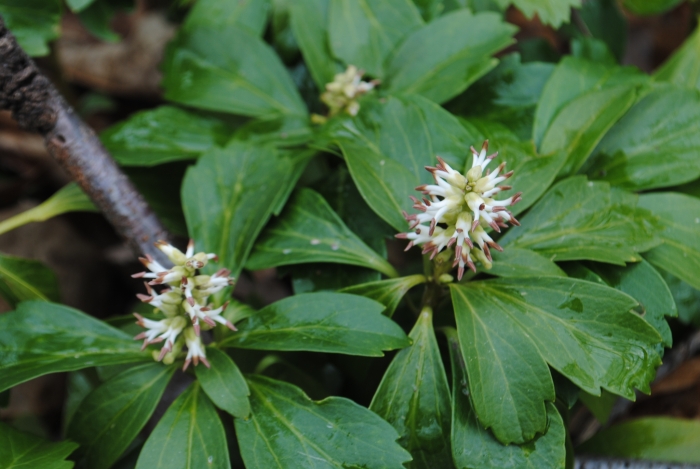Japanese Pachysandra
(Pachysandra terminalis)
Japanese Pachysandra (Pachysandra terminalis)
/
/

Zihao Wang
CC BY 4.0
Image By:
Zihao Wang
Recorded By:
Copyright:
CC BY 4.0
Copyright Notice:
Photo by: Zihao Wang | License Type: CC BY 4.0 | License URL: http://creativecommons.org/licenses/by/4.0/ | Rights Holder: Zihao Wang | Publisher: iNaturalist | Date Created: 2017-04-16T13:32:19-07:00 |









































































Estimated Native Range
Summary
Pachysandra terminalis, commonly known as Japanese pachysandra, carpet box, or Japanese spurge, is an evergreen perennial plant native to the understory of woodlands in Japan, Korea, and China. It has been introduced to eastern North America where it thrives in similar conditions. This slow-growing ground cover reaches a height of 10 cm (4 in) and can spread up to 60 cm (24 in) wide. It features alternate, simple, glossy leaves that form a lush carpet of greenery. The leaves may yellow when exposed to direct sunlight or during winter stress. Pachysandra terminalis blooms in early spring, producing small, white, inconspicuous flowers that are not particularly showy.
This species is valued for its ability to form a dense ground cover, suppressing weeds and requiring minimal maintenance once established. It is ideal for shaded garden areas, under trees, and on north-facing slopes where other plants might struggle. While it prefers part shade to full shade, it is adaptable to various soil types, provided they are well-drained. Overwatering should be avoided to prevent root rot. Pachysandra terminalis is also used in container gardening and window boxes in shaded locations. It can take about three years to establish a solid groundcover, with initial plantings spaced 15–30 cm (6–12 in) apart. Gardeners should be aware that in some regions, it can become invasive and should be planted with care to prevent unwanted spread.CC BY-SA 4.0
This species is valued for its ability to form a dense ground cover, suppressing weeds and requiring minimal maintenance once established. It is ideal for shaded garden areas, under trees, and on north-facing slopes where other plants might struggle. While it prefers part shade to full shade, it is adaptable to various soil types, provided they are well-drained. Overwatering should be avoided to prevent root rot. Pachysandra terminalis is also used in container gardening and window boxes in shaded locations. It can take about three years to establish a solid groundcover, with initial plantings spaced 15–30 cm (6–12 in) apart. Gardeners should be aware that in some regions, it can become invasive and should be planted with care to prevent unwanted spread.CC BY-SA 4.0
Plant Description
- Plant Type: Herb, Subshrub
- Height: 0.6-1 feet
- Width: 1-1.5 feet
- Growth Rate: Slow
- Flower Color: N/A
- Flowering Season: Spring
- Leaf Retention: Evergreen
Growth Requirements
- Sun: Part Shade, Full Shade
- Water: Medium
- Drainage: Fast, Medium, Slow
Common Uses
Bank Stabilization, Border Plant, Deer Resistant, Erosion Control, Groundcover, Low Maintenance
Natural Habitat
Understory of woodlands in Japan, Korea, and China
Other Names
Common Names: Japanese Pachysandra, Carpet Box, Japanese-Spurge, Japanischer Ysander, Pachysandre À Épis Terminaux, Dikkemanskruid, Pachysandra, Skuggröna, Skugg-Gröna, 수호초
Scientific Names: , Pachysandra terminalis, Pachysandra terminalis var. variegata, Pachysandra termialis,
GBIF Accepted Name: Pachysandra terminalis Siebold & Zucc.